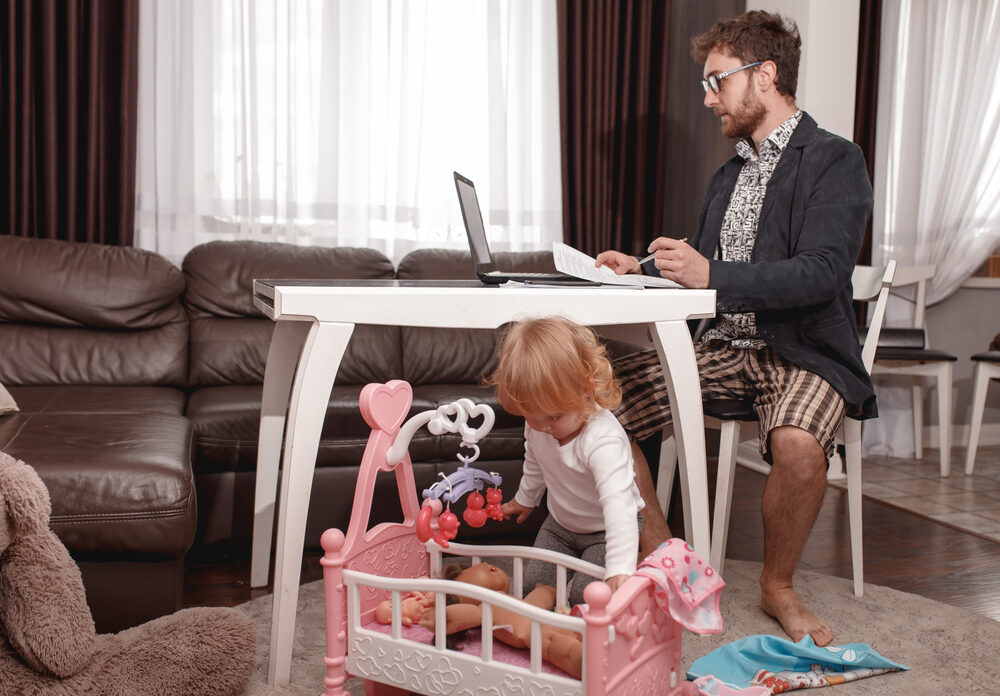Thinking about working from home in the Netherlands? There’s nothing more ideal than snuggling up with a house-made coffee, turning on your laptop, and working like a boss in your underwear (it’s okay, we won’t tell).
Luckily, if you’re in the Netherlands, you’re well-placed to work from home. In fact, 1.2 million Dutchies did just that in 2019.
So, how did the Netherlands gain such a great reputation for working from home? Is the future of working from home in the Netherlands at risk?
And how can you get in the home-office game — while still impressing your boss?
READ MORE | 7 top pieces to upgrade your home office in the Netherlands
We’ve compiled all the information about working from home in the Netherlands in one place. Let’s get cracking!
Working from home in the Netherlands is common
Really common. In fact, the Netherlands is the second-best place to work from home in 2023. Around 8.8% of Dutch people worked from home.
And this isn’t new: even before the coronavirus hit the country, the number of remote workers had increased by half a million from 2013 to 2019.
My new #workfromhome supervisor is quite the micromanager pic.twitter.com/SVqkCmYiNx
— Jessica Tai (@j__tai) March 16, 2020
Despite the excellent Dutch public transport system, many Dutchies choose to work at home to cut their travel time.
In some places in the Randstad (like Amsterdam, Utrecht, the Gooi, and Vecchstreek), almost half of the workforce worked from home at least sometimes in 2019, according to the Central Bureau of Statistics.
You may have a legal right to work from home
The Flexible Working Act in the Netherlands has been in force since January 1, 2016.
Among other things, the Act stated that after an employee has been working for more than six months, they can ask to adjust their hours or place of working. The employer can only deny the request if they have a good reason.
The Netherlands is relatively progressive in this arrangement. But, companies may not always be in favour.

Computer giant IBM became the first multinational this century to encourage its workers to work from home. Ever since then, the company has had 21 quarters of falling profits and ordered thousands of employees to return to the office “or else leave the company.”
They’re not alone: Yahoo, Honeywell, and Bank of America also brought their employees back to the office.
If you’re hoping to find a job that easily allows for remote work, we suggest you search for IT jobs from home, virtual assistant roles, and software engineering positions.
Is working from home all it’s cracked up to be?
It sounds like a dream, right? No commute time, no office clothing, and the ability to ignore annoying colleagues if they message you. Yep, working from home sounds great — and it will make you more productive, right?
But in reality, working from home can dramatically affect your productivity. In the US, the benefits of working from home have been called “the big lie.”
Problem with trying to #WorkFromHome is one moment you are clacking away at your computer and the next you are washing curtains
— Nandini Nair (@NandiniNai) March 17, 2020
Despite employees promising their bosses (and themselves) that they’ll be up early, tapping away on their computer at their kitchen table, that’s not always what happens.
A Dutch study from 2018 found that employees have too little self-discipline. They are often distracted at home by laundry or catching up on Netflix.
The same study found that combining work and family can make you more exhausted, leading to more arguments at home.
Succeeding at working from home in the Netherlands
Determined to nail the Dutch work-life balance and thrive in your home office? Here are our tips.
Get into a routine
Sometimes, it’s a little hard to separate home life from work life — and it’s easy to lose focus on work and instead revert to doing chores. But, of course, it’s hard to concentrate if you’re constantly getting distracted.
Also, keep in mind that you don’t have a boss coming and monitoring your screen every now and then, so it’s easy to let your mind wander.

It helps to wake up at a certain time in the morning and set hours for yourself when you’re going to work.
Decide when your lunch break will be, if you’ll have a designated time to do chores, and how you will make up that work time later in the day.
READ MORE | Dutch Quirk #5: eat cheese every day for lunch
And, remember not to lounge around in your pyjamas: getting dressed, brushing your teeth and wearing proper clothes can make a big difference to how productive you feel.
Don’t isolate yourself completely
Although the idea of working from home is pretty appealing, keep in mind that human beings were made for social interaction — that’s why some people prefer to work in an office.

Physical contact has been linked to better ideas, communication and decision-making. In this case, it might be nice to have a balance between working from home and working in an office
Don’t be afraid to work outside of home
Working from home doesn’t have to be taken literally — especially as Dutch houses and apartments can be notoriously small.
Get out in the world and check out some coworking spaces if you need a bit more of a routine.

Fortunately, because working from home in the Netherlands is so widespread, there are plenty of coworking spaces available. While the majority of them are paid, some municipalities also fund some that are completely free.
READ MORE | 13 best places to study or work in Amsterdam
Coworking spaces offer a great opportunity to network, have a great working space, and often have ultra-fast internet and complimentary tea and coffee. Check out coworker.com to find one near you.
Or, if you’re feeling a little extra, there are plenty of super gezellig cafés in each Dutch city that you can work from.
Good Wi-Fi is key
If you’re working from home, you’ll likely be communicating frequently with your company or organisation. It’s absolutely essential to have fast WiFi.

Added bonus? Ultra-fast streaming for when the workday is over!
Make sure everyone is on the same page
If you are making the shift to working from home make sure you are upfront and clear with your bosses about what is expected.

Do you need to keep working your normal hours, or can you be flexible and work in the evening? Do you need to be available for calls?
Can you work from another country? Do you ever need to show up to the office? How will your success be measured in the future?
READ MORE | Mental health in Dutch workplaces: an expert’s tips (and signs of a top employer)
Remote working relies on mutual trust to be effective. Discuss the ‘what’ and ‘how’ with your boss and talk about whether you need to come to an agreement in writing.
Know when to call it quits
Working from home isn’t for everyone — and few people find it to be a natural and easy adaptation. Give yourself some time to settle in and focus on making it work.

But, sometimes, it doesn’t work out. Think about how long you’ll try it out and when you may think about returning to the office. It doesn’t mean you failed — it just means you tried.
What do you think are the benefits of working at home? Tell us in the comments!
This article was co-authored by Vedika Luthra and Samantha Dixon
Editor’s Note: This article was originally published in March 2020, and was fully updated in October 2023 for your reading pleasure.





Does not help the dusabled who can only work from bome. Why not research that since the NETHERLANDS is supposed to be inclusive and non-discriminating towards the dusabled.